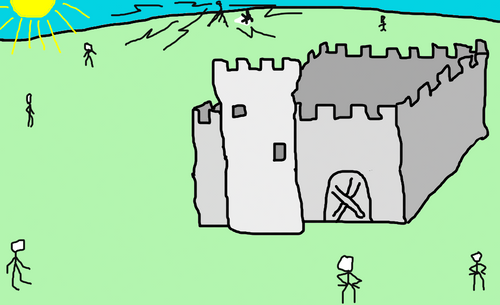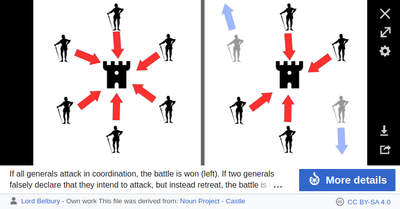Inspiration comes in odd places at odd times. While we were on the road, my wife made an appointment to get her hair done in one of the upcoming cities. Fine. But, neither of us knew it was located exactly in the middle of a major university. Dead center. There is nowhere, not one place, to park a vehicle in such a situation. It's all madly driven cars, bicycles, mopeds, electric mopeds, pedestrians, joggers, and pigeons. I dropped her off mid-stop light. Then, I rambled aimlessly looking for a place to park. I employed John Steinbeck's definition of the Spanish word vacilar to generally move northward in hopes of finding a space to pull in. Like Polaris, the North Star, pulling me as a beacon, I drove around, rather aimlessly, somewhat vacilar.
After some time, I found myself at the top of a hill beside the university astronomy observatory and adjoining the stone carillon. There was a grand view out over a grand lake...and three empty parking spaces! Three! I slid in, parked.
"Can I really park here without a permit?", I wondered. The sign said "Permit required, 7:00am to 4:30pm". It was 4:45pm. "I'm good to go!", I thought.
It was a prime spot. The two spaces behind me were quickly taken and the occupants snapped photos, then walked off. Lots of people drove up, looked for spaces unsuccessfully, got out and snapped photos anyway, then drove off. Lots of people walked up, jogged up, biked up, many passed along, many stopped for the photo op. Orientation groups wandered up, stopped, then every soon-to-be college kid snapped selfies with the lake in the background.
I settled in, opened a beverage, put on a podcast. At 5:00pm, the carillon chimed out the Westminster chime, then five dongs. With the lake breeze, the view, the beverage, it was a good spot.
The podcast was talking about Artificial Intelligence (AI), as that seems to be the talk du jour. However, it mentioned the Byzantine Generals problem, that old, "Bitcoin solves this" conundrum. I'd not considered it in a while.
Somehow, perhaps with the blend of the AI talk, the setting, lake breeze, bell chimes, relief from traffic, and the beverage...my mind drifted enough to conjure up an odd allegory involving generals, God, a guy named Larry, and a scoreboard.

Byzantine generals problem
The short and simple version of the Byzantine generals problem is this: the problem is trust. Several generals are attacking a fort, if they all attack at once, they'll win. If a couple of them retreat, then those who siege the fort will lose. They meet the day before and make a plan to attack. They all agree to the attack. They set an agreed upon time. Then, they adjourn and go to their separated positions to await the attack time.
The problem is trust. There is a chance that a general or two may lose nerve and back out. Then it's ruin for the others. Or, maybe messengers are sent out from the top general saying the attack must delay 12 hours for some tactical reason or other. Can they then trust that all of the generals indeed received the accurate message? Will they all trust the messenger and follow through to carry out the attack at the new time (an uncoordinated attack will mean ruin). Or, worse still, what if a general or two is a bad actor, a deceiver, who says one thing, but ultimately is lying so that the others will be ruined. Looking at the graphic below, two deviously ambitious generals could plot a power takeover in such a situation...they say they'll attack, then don't attack. This allows all the others to be killed, and allows for the two survivors to reconvene as the now sole military leaders. Even a back-stabbing, low-ranking messenger could alter the message for whatever bit of avarice his heart may lust after, or 30 pieces of silver.

The problem is trust. Or, the lack of trust. Despite the most determinedly solid plans and promises, in the end, the generals must attack or not and just hope for the best. Unsure.
God
Sitting atop the observatory hill overlooking the lake, in the breeze, sipping, I allowed a bit of a thought exercise to flow through my mind. I had a little, personal, mental Chautaqua.
"Those generals couldn't trust one another or their messengers. What if those generals had someone they could trust?", I wondered.
But, whom can be trusted? I trust my Mom. Yet, I'm not sure if Mom care's to be involved with a Byzantine siege. Those Byzantine generals don't know my Mom anyway. Why would they trust her?
In God We Trust. Well, since I'm just thinking here, suppose God is there. Like meeting Moses atop Mount Horeb, suppose God is physically there with those generals. (I'm not sure why God is conspiring in a Byzantine war, but just go with me on this.) The generals trust God. He is omnibenevolent -- all good, incapable of evil or lying or deceit. He can be trusted.
So, suppose the generals have agreed upon a high-noon attack time. They are in position and are waiting for the hour. But, suppose they had established a sensible clause regarding the weather, saying, "Attack at noon if sunny. If there is rain, do not attack." (Scaling wet ladders to siege a fortress wall poses a safety concern...safety comes first, even while attacking a fort.) Suppose, at the eleventh hour, a slight mist wanders up and covers the fort. It's not exactly raining, but the mist is in fact covering the fort, the grass, and the ladders. "Is it still on?", the generals wonder. They may think the attack is still on. But, then they wonder, "Does everyone assume it's still on? What if General Pencilneck chickens out? He can't swim and any water terrifies him." Even if only Pencilneck holds off on attacking, the siege is ruination for the attackers. Doubt creeps in.
Suppose the generals have a conduit to God, a two way prayer conduit, where a general prays to God and God answers right back.
"Dear God," Gen. Pencilneck prays, "is the attack still on?"
"Yes, Pencilneck. The attack is still on," God answers definitively. "And, I'm telling all the other generals the same -- the attack is still on. Attack at noon and you will win."
That's 100% clear, and since God is a trusted third party, everything is good to go.
Of course, the problem with this scenario is the two way conduit with God. That's not how God works, not how God communicates. So, to further our thought exercise, we need some other trusted third party.
Larry
Suppose there's a guy named Larry. He's kind of geeky, goofy but funny, and a bit chubby in a likeable way (of course, this guy's name is Larry). Larry just happens to be up on that hill by the fortress. Maybe he's having a picnic. He's totally separate from the attack, has no interest on either side, fort or generals. And, Larry is a Ham radio guy. That's his thing, setting up and broadcasting over the air. Larry is thinking about doing a "Larry Podcast" every Thursday on how to rebuild PCs from upcycled parts.
The generals decide to employ Larry. He has a good observation point, he has the equipment, he's indifferent to any result. He could even be incentivized. For every accurate message he relays, Larry would be paid, say $10 USD. There's an incentive for him to be as accurate as possible.
Larry, his equipment, his uninterested third-party position, and the incentive structure, would solve the trust and doubt problem.
Except, that it wouldn't.
In its essence, Larry is no different than the fleet-footed private literally running to carry messages from general to general. What if...
- Larry's equipment fails or the battery goes dead?
- The message gets lost in translation (what language to Byzantine generals actually use anyway)
- The emperor of the fort counter-offers Larry a huge sum to deceive the Byzantine generals
- At exactly the most critical moment, Larry keels over from a massive coronary, years of cigarettes and bacon cheeseburgers finally coming home to roost
You see the point. Although better than zero communication among the separated generals, there is a still a point of failure and it's name is Larry. They still aren't completely sure everyone is together on the attack. The problem is trust.
Scoreboard
Let's go one last step in this thought exercise.
Suppose there's a huge scoreboard erected on the hilltop. Maybe it's erected as a monument to Larry and the life he'd lived and lost up on that hill. Thank you for your service, Larry. The scoreboard is fantastic, it's a mega jumbo-tron like you see in all the modern sports arenas these days. 8K Ultra HD quality even. Somehow, it shows each general's plans, communications, positions and actions in real time. Not sure how it does this, it just does.
Now, each general can see and know the critical information on every other general. The consensus they'd enjoyed just after their initial meaning remains intact. Doubt does not creep in. A mere glance at the giant scoreboard reveals all. They don't have consensus-then-doubt, they have continual consensus.

For kicks and giggles, see my comic scoreboard explanation of Bitcoin in the @Bitkenstan comic. Episodes 77 through 86 are the ones that explain this part of the story.
This scoreboard system is decentralized because no one runs it, not the generals themselves, not God, not Larry. And, it is always 100% accurate. There is no point of failure. It's never wrong. It can be trusted.
The trust problem is solved. The Byzantine generals can attack, or not, with 100% confidence.
Summary
This is what Bitcoin does. Vires en numeris...strength in numbers. In the Bitcoin world, this tagline essentially means that there is power in the many nodes that run Bitcoin, that there can be trust in that system, the code and cryptography that run it...that there can be trust in Bitcoin.
When crypto skeptics say, "Bitcoin isn't backed by anything." It is this.

You ask, "What's Hive?" Watch the animation I made: The Hive Story Animation and you'll learn about this Web3 chain. The top benefits of the Hive blockchain: (1) no ONE person/group runs it, (2) YOU own and control your content, and (3) YOU earn the rewards that your content generates. Learn more or consider using my referral link to get your free account here and I'll support you as you begin. Alternately, you can see other sign-up options here. All my links: https://linktr.ee/crrdlx.
o